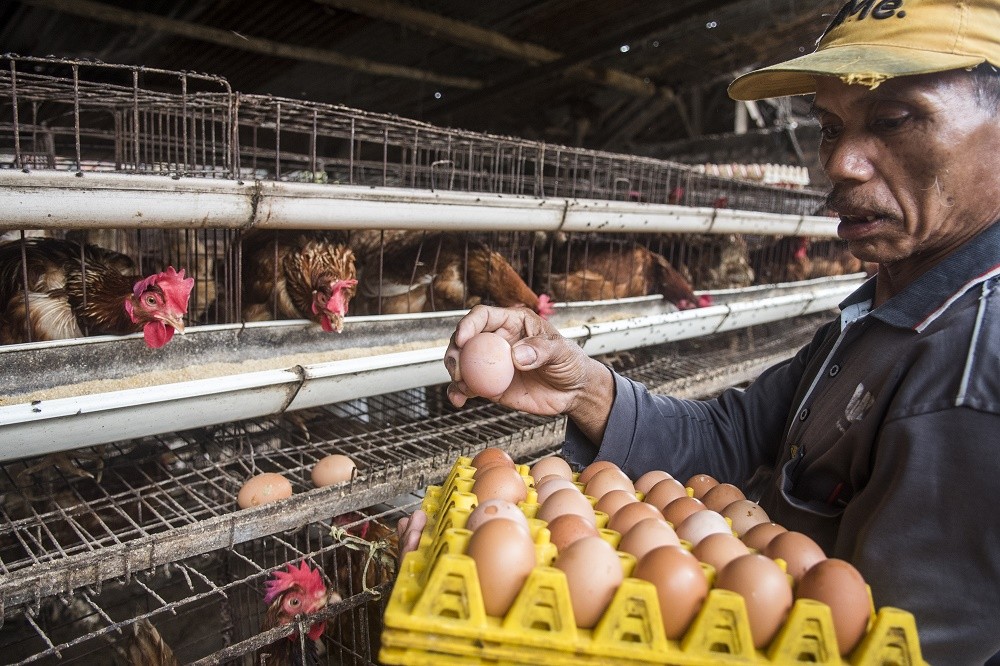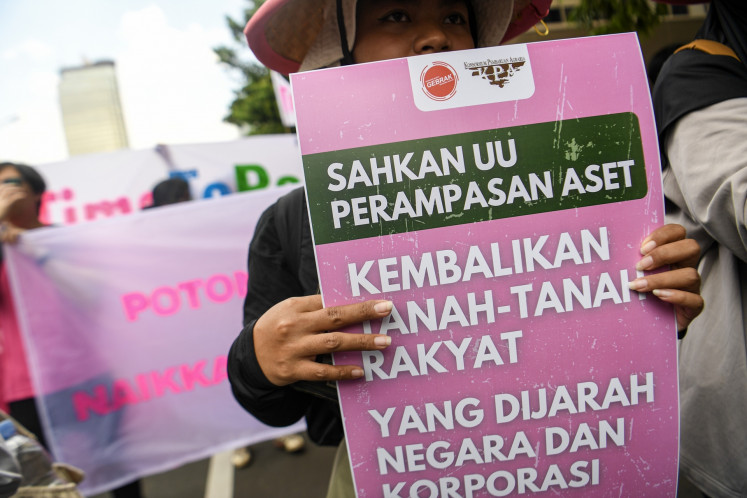Popular Reads
Top Results
Can't find what you're looking for?
View all search resultsPopular Reads
Top Results
Can't find what you're looking for?
View all search resultsInflation rises to nearly five-year high
BPS consumer price index was up 3.55 percent in May, marking the fastest annual rise since December 2017.
Change text size
Gift Premium Articles
to Anyone
I
nflation in Indonesia has risen at the fastest pace in almost five years as restricted supplies of food and energy in the global market impact domestic consumer prices.
Statistic Indonesia (BPS) reported on Thursday that its consumer price index was up 3.55 percent year-on-year (yoy) in May, marking an acceleration from the annual rate of 3.47 recorded in April.
“The 3.55 percent [annual inflation rate] is the highest since December 2017,” BPS head Margo Yuwono said in a press briefing on Thursday.
The rate is withing Bank Indonesia’s (BI) inflation target range of 2 to 4 percent.
Read also: Inflation jumps to nearly 3-year high, GDP growth steadies
On a monthly basis, however, consumer prices in May increased by 0.4 percent, significantly slower than the 0.95 percent rise seen in April, but faster than the 0.32 percent logged in May of last year.
The food, beverage and tobacco spending group was the largest driver of monthly inflation in May with a 0.20 percentage point contribution. Chicken eggs, fresh fish and shallots largely pushed up prices in this group.
The transportation spending group, especially airfares, was the second-largest contributor to May’s inflation with a 0.08 percentage point contribution. Rising transportation fares were in line with surging aviation fuel costs on the back of high global oil prices, according to Margo.
Fast rising consumer prices have been reported in many countries as global food and energy prices have risen rapidly over the past year amid increased demand in markets recovering from the impact of the coronavirus pandemic.
Supply shortfalls caused by the Russia-Ukraine war and related sanctions imposed on Russia, as well as by unfavorable weather conditions in some food-producing countries, have exacerbated the crunch.
As of Thursday, some 10 countries had imposed export restrictions on food or fertilizer. Countries restricting food exports include Turkey, Malaysia and India, while countries limiting fertilizer exports include China, Vietnam and Kyrgyzstan.
“This will all have a global impact as well as an impact on Indonesia,” Margo said.
Indonesia lifted a three-week-long palm oil export ban on May 23. The ban had begun on April 28 as the government attempted to tame soaring domestic cooking oil prices.
Russia’s invasion of Ukraine came at a time when global food and energy prices were already elevated. Over the last 18 months, wheat prices have risen nearly 110 percent, corn and vegetable oil prices are up 140 percent and soybean prices are up 90 percent, data from the US Foreign Agricultural Service show.
Rising global wheat and soybean prices, for instance, have begun to show at the wholesaler's level, according to Margo.
Wholesale prices rose 0.33 percent in the month of May, with wheat flour being the largest contributor, while monthly inflation in the industrial sector was 0.31 percent.
At the retail level, however, the rising cost of wheat flour is not yet significant, according to BPS.
“But [we] still need to watch out; continually rising international [imported food] prices will have an impact on [domestic] prices, especially on the derivatives industry,” he said.
Read also: Govt allows higher airfares in response to fuel price hike
Core inflation rose to 2.58 percent yoy in May, suggesting a further recovery in consumer demand amid eased public activity restrictions during the Idul Fitri holiday. Meanwhile, volatile price inflation was 6.05 percent yoy and government-administered price inflation was 4.83 percent yoy.
“There is a trend of increasing government-administered price inflation, which has been mainly caused by the government’s decision to allow airlines to hike airfares as well as raising the price of Pertamax fuel,” said Margo.
The annual inflation rate roughly matches the forecast of 3.59 percent yoy from both state-owned publicly listed Bank Mandiri and the market consensus.
Bank Mandiri economist Faisal Rachman has projected a further increase in inflation in the second half of this year, mostly due to rising demand amid an accelerating economic recovery.
However, he said he expected the inflation rate to potentially be lower than the previous forecast of 4.60 percent, which he suggested would give BI enough room to keep its seven-day reverse repo rate (BI 7-DRRR) at 3.5 percent for some time.
“Considering the recent developments, we also see that the policy rate hike may be lower than our initial forecast of 75 basis points [bps] this year,” he said in a statement on Thursday.
Deputy Finance Minister Suahasil Nazara said the latest inflation figure struck a balance between the interest of consumers and producers. “Consumers do not get hurt but producers are still interested, as prices may rise,” he told The Jakarta Post on Thursday.










